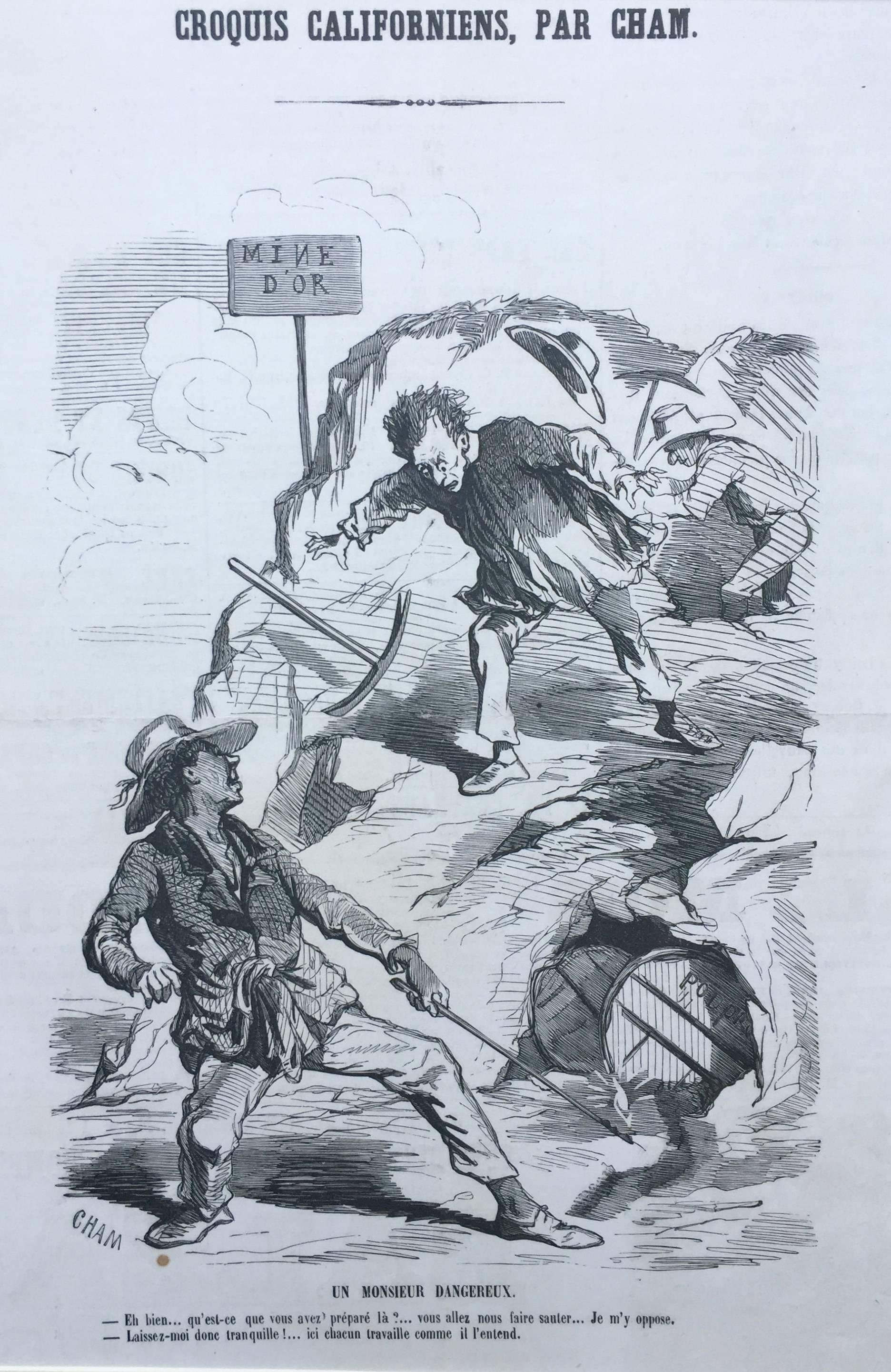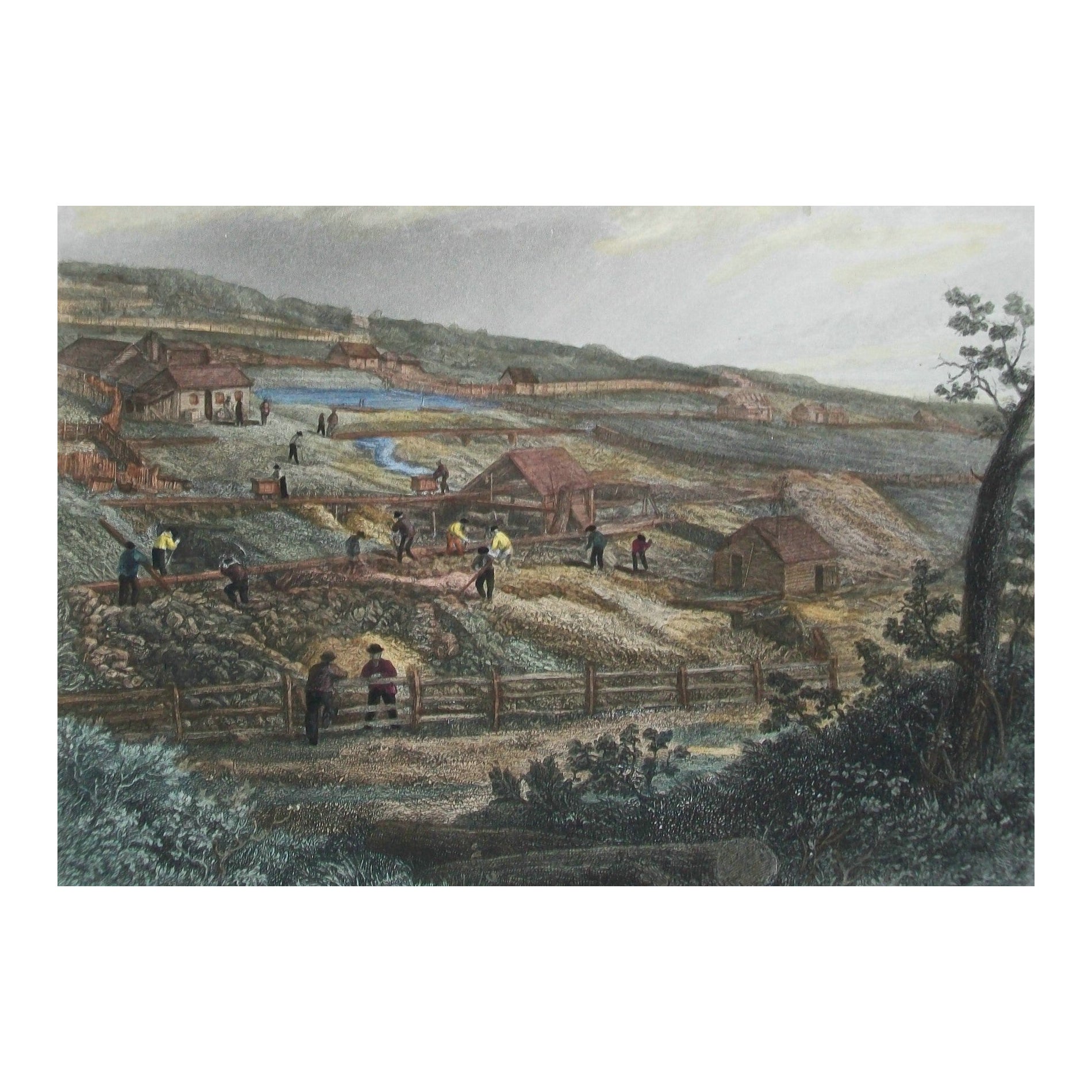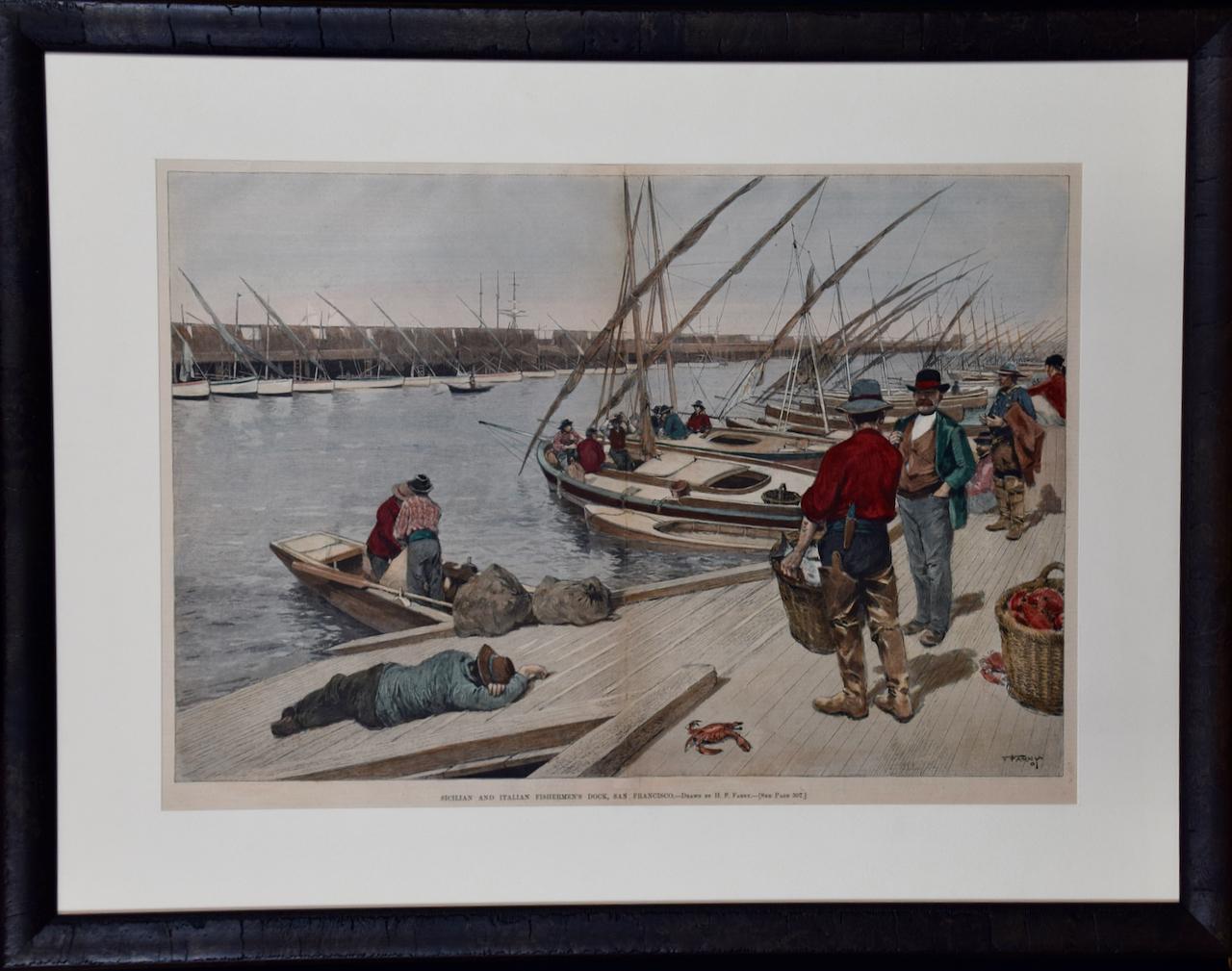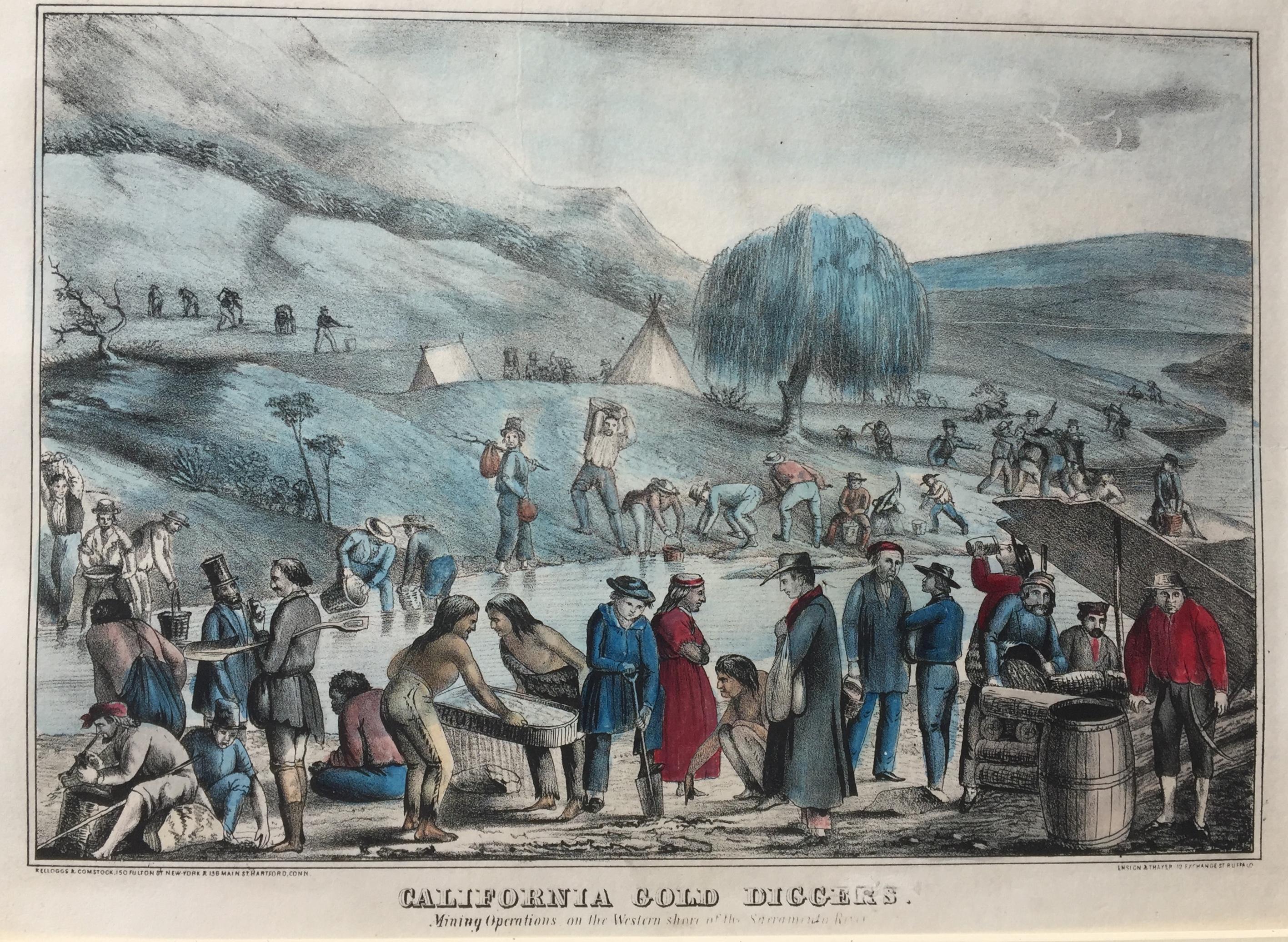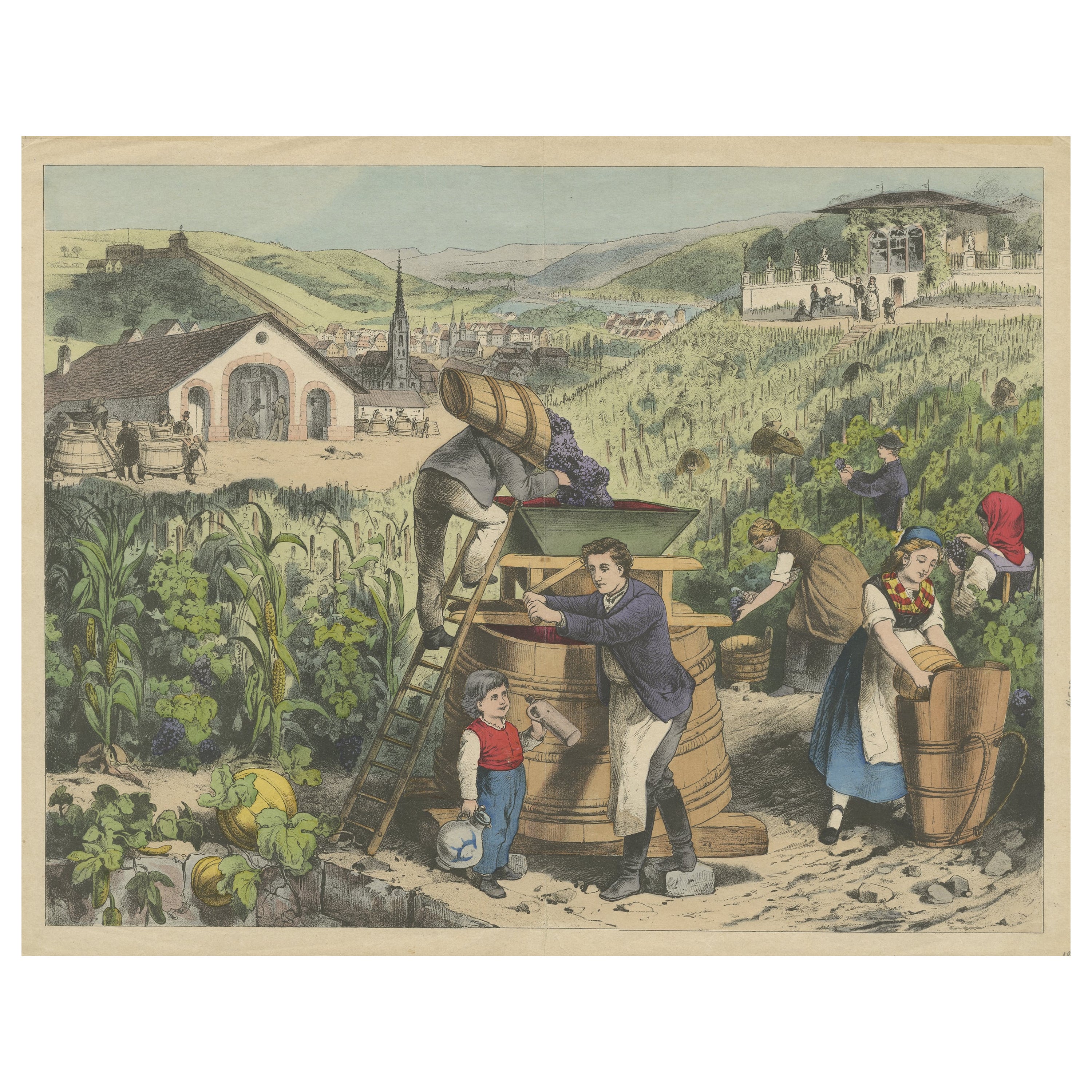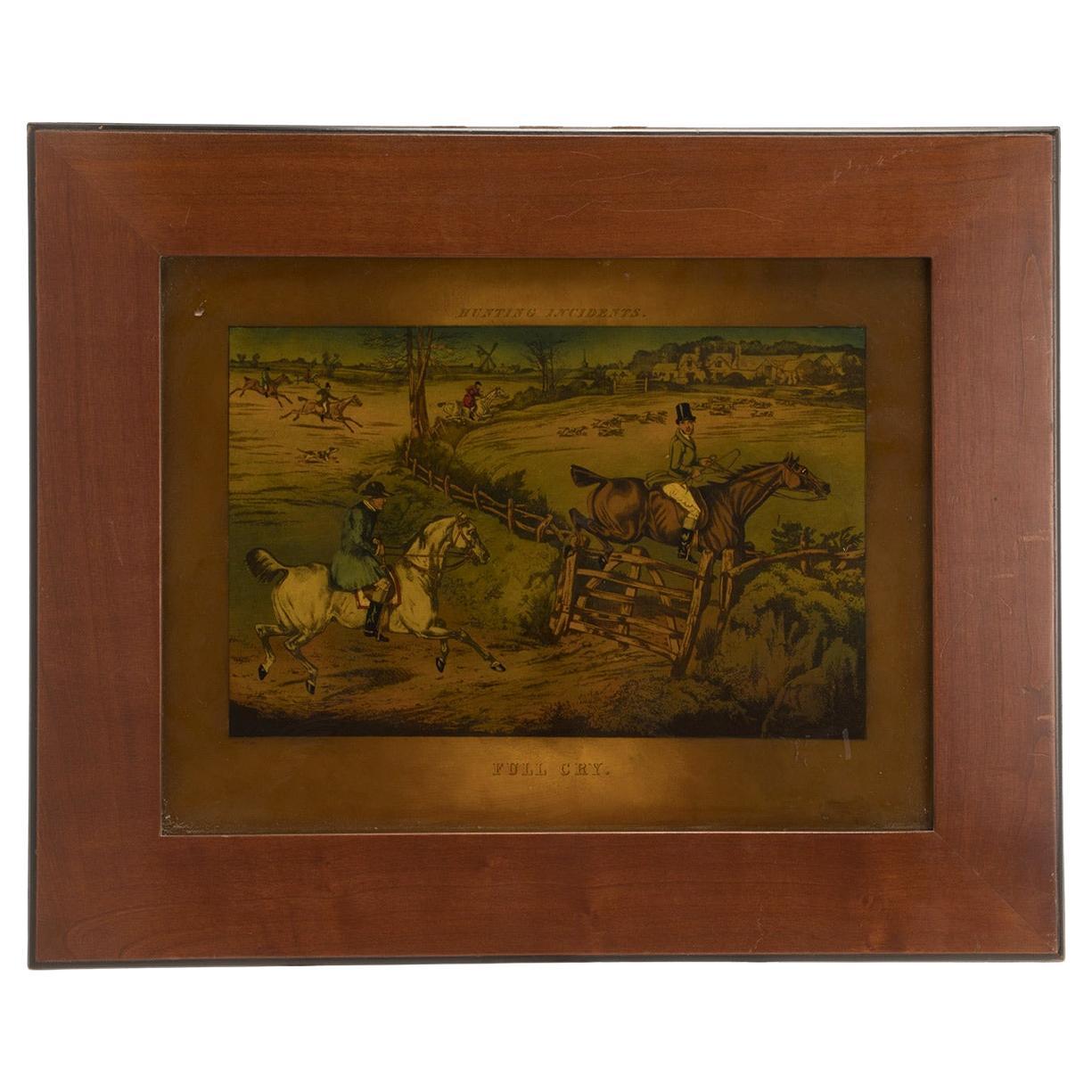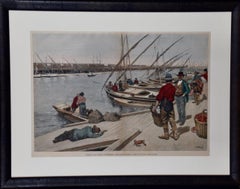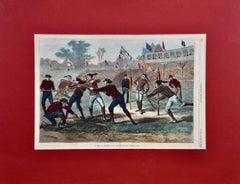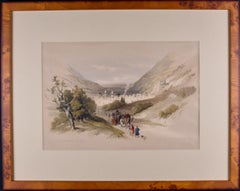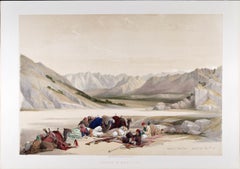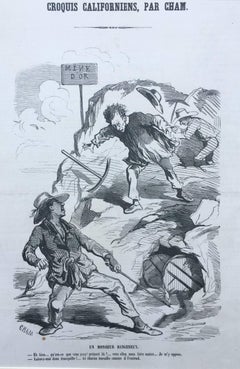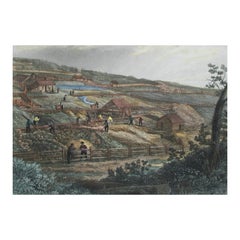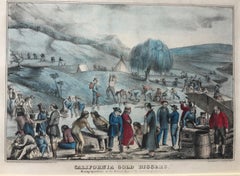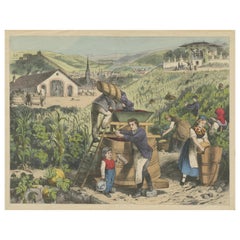Items Similar to "California Gold Diggers": A 19th C. Hand-colored Woodcut Gold Rush Scene
Want more images or videos?
Request additional images or videos from the seller
1 of 9
John Andrew"California Gold Diggers": A 19th C. Hand-colored Woodcut Gold Rush Scene1856
1856
$1,275
£966.05
€1,108.47
CA$1,794.13
A$1,972.24
CHF 1,036.52
MX$23,950.22
NOK 12,930.33
SEK 12,250.58
DKK 8,272.80
About the Item
This is a framed hand-colored woodcut engraving entitled "California Gold Diggers - A Scene From Actual Life At The Mines" created by John Andrew and published in 'Ballou’s Pictorial Drawing-Room Companion' on May 3, 1856, pg. 280-281, v. 10, no. 18. This beautifully colored original engraving depicts a California Gold Rush mining and camp scene. On the left, three miners are taking a break beside their tent with their dog, another miner is using a pick to dig a pit on the right. Multiple other miners are panning for gold in a straw in a ravine in the background on the right. The miner's equipment is shown, including: shovels, gold pans, and a gold cradle.
This attractively and historical engraving is presented in a dark brown wood faux bark frame, with a cream-colored mat and UV protected conservation glass. All the materials used are archival. The frame measures 21.13" high by 28.13" wide by 1.13" deep. There's a central vertical fold, as issues and a tiny spot in the lower left. The print is otherwise in very good to excellent condition. The print is held by the Library of Congress, among other entities.
John Andrew (1815-1875) was a British born artist and engraver, who emigrated to the United States, working in Boston, Massachusetts.
- Creator:John Andrew (1815 - 1875, American)
- Creation Year:1856
- Dimensions:Height: 21.13 in (53.68 cm)Width: 28.13 in (71.46 cm)Depth: 1.13 in (2.88 cm)
- Medium:
- Period:
- Condition:
- Gallery Location:Alamo, CA
- Reference Number:Seller: # 40201stDibs: LU117329462732
About the Seller
5.0
Gold Seller
Premium sellers maintaining a 4.3+ rating and 24-hour response times
Established in 2011
1stDibs seller since 2019
291 sales on 1stDibs
Typical response time: 1 hour
- ShippingRetrieving quote...Shipping from: Alamo, CA
- Return Policy
Authenticity Guarantee
In the unlikely event there’s an issue with an item’s authenticity, contact us within 1 year for a full refund. DetailsMoney-Back Guarantee
If your item is not as described, is damaged in transit, or does not arrive, contact us within 7 days for a full refund. Details24-Hour Cancellation
You have a 24-hour grace period in which to reconsider your purchase, with no questions asked.Vetted Professional Sellers
Our world-class sellers must adhere to strict standards for service and quality, maintaining the integrity of our listings.Price-Match Guarantee
If you find that a seller listed the same item for a lower price elsewhere, we’ll match it.Trusted Global Delivery
Our best-in-class carrier network provides specialized shipping options worldwide, including custom delivery.More From This Seller
View AllSan Francisco Sicilian and Italian Fishermen: A 19th C. Hand-colored Woodcut
Located in Alamo, CA
This is a framed hand-colored woodcut engraving entitled "Sicilian and Italian Fisherman's Dock - San Francisco", created by Henry François Farny ...
Category
Late 19th Century Landscape Prints
Materials
Woodcut
"A Game of Lacrosse": A Hand-colored 19th Century Woodcut Engraving by Hall
Located in Alamo, CA
A colorful and attractive hand-colored 19th century woodcut engraving entitled "A Game of Lacrosse" after a drawing by W. H. Hall. It was published in New York in Harper's Weekly on May 10, 1884. It depicts a scene from an intense lacrosse game.
This hand-colored woodcut engraving is presented in a red mat that measures 16" high x 20.63" wide. The sheet measures 10.63" high x 15.88" wide. There is a central fold, as issued. The print is in excellent condition.
Lacrosse is the oldest sport in North America, possibly originating as far back as the 1400's. The sport was first invented by Native Americans, who originally played it as a means to toughen braves for war or to settle tribal disputes. It was played by between 100 and 1,000 participants at a time. There were no strict boundaries and the game could cover miles and take days to complete. It was very violent with many injuries, which were sometimes fatal. The game was unknown to whites until the 17th century when a Jesuit priest observed Heron Indians playing it. He thought the stick and netting resembled the "crosier" carried by bishops during religious ceremonies, This led to the name "la crosse".
A Canadian dentist standardized the rules of the game in 1867 and the 1st college team was created at New York University in 1877. The game gained national attention and popularity in 1956 when the Hall-of-Fame football player Jim Brown...
Category
1880s Landscape Prints
Materials
Woodcut
Road to Nablous, West Bank: A 19th C. Hand-colored Lithograph by David Roberts
By David Roberts
Located in Alamo, CA
"Entrance to Nablous, The Holy Land (West Bank)" is a framed 19th century hand-colored lithograph by David Roberts from the large folio edition of his monumental 6 volume publication...
Category
1840s Realist Landscape Prints
Materials
Lithograph
Approach to Mount Sinai 1839: Roberts' 19th C. Hand-colored Lithograph
By David Roberts
Located in Alamo, CA
This is an original 19th century hand-colored lithograph entitled "Approach to Mount Sinai Wady Barah Feby 17th 1839" by David Roberts, Plate 122 in Volume III of his Egypt and Nubia...
Category
1840s Realist Interior Prints
Materials
Lithograph
David Roberts' 19th Century Hand Colored Lithograph, St. Jean D'Acre
By David Roberts
Located in Alamo, CA
"St. Jean D'Acre" is a 19th century folio sized hand-colored lithograph from the "The Holy Land, Syria, Idumea, Arabia, Egypt and Nubia" volume of David Roberts’ large folio edition,...
Category
1840s Realist Landscape Prints
Materials
Lithograph
Winslow Homer 19th Century Woodcut Engraving "Making Hay"
By Winslow Homer
Located in Alamo, CA
This Winslow Homer woodcut engraving entitled "Making Hay", was published in Harper's Weekly in the July 6, 1872 edition. It depicts a two men hand cutting high grass on a hill. The man in the foreground is looking at a young boy and a girl (presumably his children), who are sitting on the ground with a picnic basket.
This beautiful Homer woodcut engraving is presented in a brown wood frame and a light beige fabric mat with a black inner mat. The print is in excellent condition.
There are two other Homer woodcut engravings in identical frames and mats that are listed on 1stdibs. See LU117326148332 and LU117326148272. These would make a wonderful display grouping. A discount is available for the purchase of two or all three of these prints.
This Winslow Homer engraving...
Category
1870s American Impressionist Landscape Prints
Materials
Engraving, Woodcut
You May Also Like
CALIFORNIA 1850 GOLD RUSH CARICATURE
By Charles Amedee de Noe (CHAM)
Located in Santa Monica, CA
CALIFORNIA GOLD RUSH CARICATURE
Charles Amédée de Noé, aka CHAM (1819 -1879)
CROQUIS CALIFORNIENS, ca. 1850
Lithograph image inc. text 10 ½ x 6, sheet 14 x 9 1/2 inches. French...
Category
1840s Barbizon School Figurative Prints
Materials
Lithograph
J.C. Armytage, 'Concordia Gold Mines', Hand Colored Engraving, U.K., C.1874
Located in Chatham, ON
JAMES CHARLES ARMYTAGE (1820-1897) - 'Concordia Gold Mines' - Antique steel plate engraving from 'Australia' by Edwin Carton Booth - hand colored - titled lower center - signed lower...
Category
Antique Late 19th Century English Victorian Prints
Materials
Paint, Paper
CALIFORNIA GOLD DIGGERS
Located in Santa Monica, CA
CALIFORNIA GOLD RUSH - c. 1849 - Early
CALIFORNIA GOLD DIGGERS - Mining Operations on the Western Shore of the Sacramento River, 1849 (Finley 111) Lithogr...
Category
1840s Other Art Style Prints and Multiples
Materials
Lithograph
Antique Print of Wine Harvesting, ca 1865
Located in Langweer, NL
Antique print of the harvesting of wine. Rare. No second copy found online.
Source and maker: unknown. More research needed.
Condition: Good. Fresh colours of a clean image. ...
Category
Antique 1860s Prints
Materials
Paper
$287 Sale Price
20% Off
A color print depicting a hunting scene, England 1880.
Located in Milan, IT
A color print on paper, depicting a hunting scene (Full Cry – Hunting incidents). Solid cherry wood frame, polished and beeswaxed. England circa 1880.
Category
Antique Late 19th Century English Prints
Materials
Glass, Wood, Paper
Antique Chromolithograph of German Settlement in America, circa 1890
Located in Langweer, NL
Antique Chromolithograph of German Settlement in America, circa 1890
Description:
This richly detailed chromolithograph, titled “Deutsche Ansiedelung in Amerika” (German Settlement ...
Category
Antique Late 19th Century German Prints
Materials
Paper
